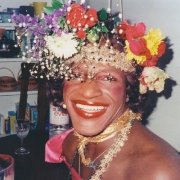Profile | Remembering Marsha P. Johnson
In celebration of LGBT History Month the Network will be profiling a selection of LGBT figures who have played significant roles in shaping modern LGBT culture or had a significant impact on LGBT issues in the public consciousness.
Today we remember Marsha P. Johnson. She was a trans black woman activist that lived in New York until her death in 1992. She is remembered by some as the person who threw the stone which broke the front window of the Stonewall Inn, in New York on the 28th June 1969. While the account that she cast the first stone is disputed, what is not in dispute is that the Stonewall uprising birthed the modern LGBT rights movement.
Marsha is believed to have played a key role in the uprising that began at the Stonewall Inn in New York’s Greenwich Village after police raided the gay bar. Protests followed over the next six days. Marsha was on the front lines of those protests against oppressive policing, which disproportionately affected the LGBT community in New York at that time. Throughout her life she advocated tirelessly on behalf of trans people, sex workers and people with HIV/AIDS. She did all this in heels, fabulous outfits and flower headpieces.
“We were … throwing over cars and screaming in the middle of the street ’cause we were so upset ’cause they closed that place,” Marsha told historian Eric Marcus in a 1989 interview. “We were just saying, ‘no more police brutality’ and ‘we had enough of police harassment in the Village and other places’.”
The first anniversary of the protests prompted the first gay Pride parade in 1970.
An interaction with a reporter gave us one of her many memorable quotes, when asked what she wanted from the Pride protests she responded: “Darling, I want my gay rights now.”
Marsha was a drag queen and a sex worker; she was often homeless and she is remembered as one of the most significant activists for transgender rights, although the term ‘transgender’ wasn’t commonly used during her lifetime. Johnson identified as a ‘transvestite’, gay and a drag queen, and used she/her pronouns.
Marsha died in disputed circumstances following the 1992 New York Pride march. Her body was recovered from the Hudson river with a large wound to the back of her head. Her death is recorded by the NYC Coroner as a suicide but her friends and family dispute this.
Constable Paul Bloomer says: “It’s sad that she never got to see the many changes that have come about as a result of the activist movement she helped start. She never got to see police eventually embrace the LGBT community and become part of the Pride parades which were once protests against police action. She never got to see the New York Police Department on the 6th June 2019 make a formal apology for the past treatment of LGBT people and the raid which started the Stonewall uprising.
“The actions taken by the NYPD were wrong, plain and simple” said James P. O’Neill, the NYPD Commissioner. That frank admission was a momentous moment for LGBT activists, many of whom felt it was long overdue. The city of New York has also recently commissioned a public monument dedicated to Marsha’s memory.
Constable Paul Bloomer continued: “When I was searching for images for this article I found it hard not to smile when looking at pictures of her. Marsha will always be remembered as an icon of the LGBT rights movement. Her smiling face remains a beacon of inspiration to many today.”




